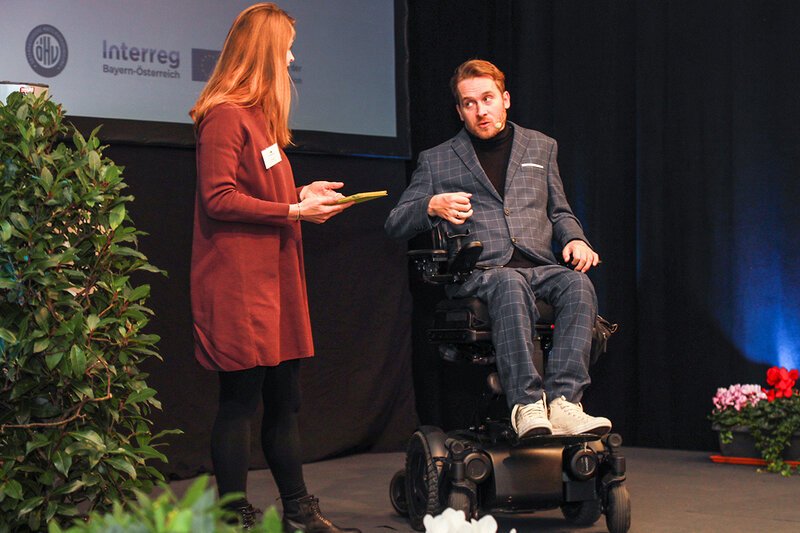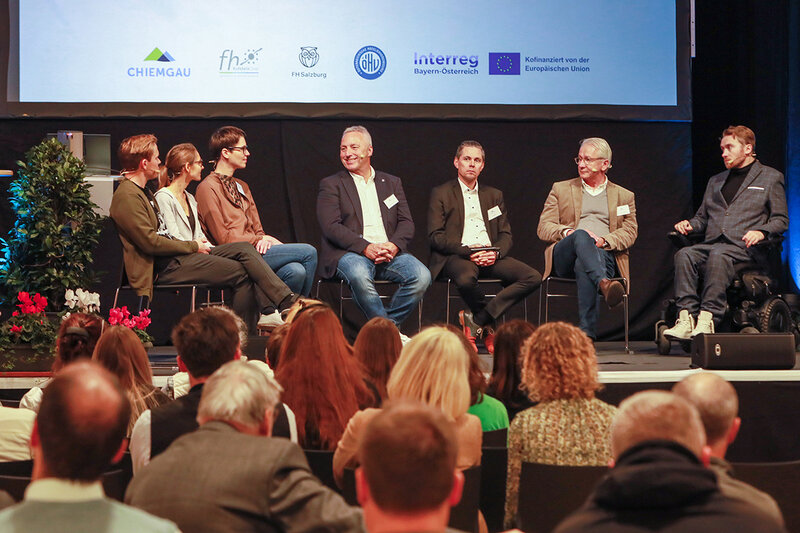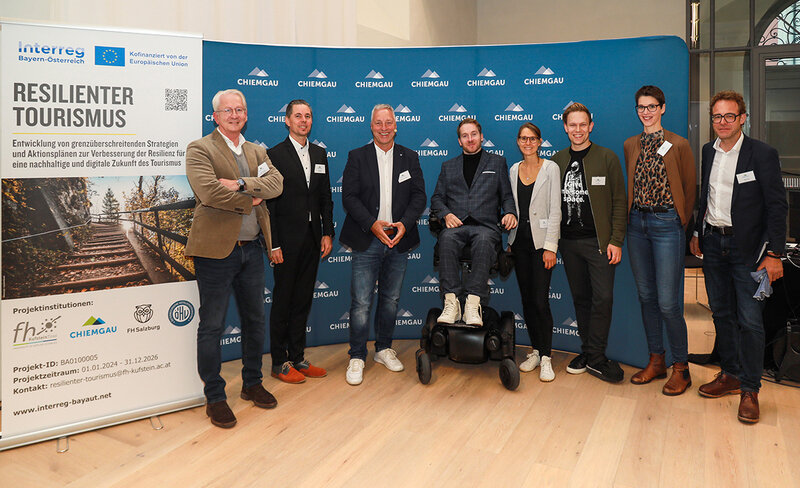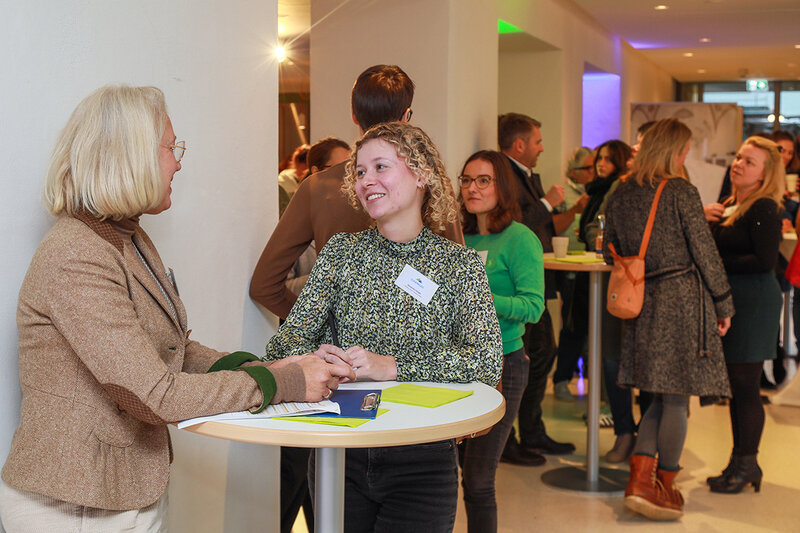1ST CONGRESS OF THE RESILIENT TOURISM RESEARCH PROJECT
- 20.12.2024
- Research
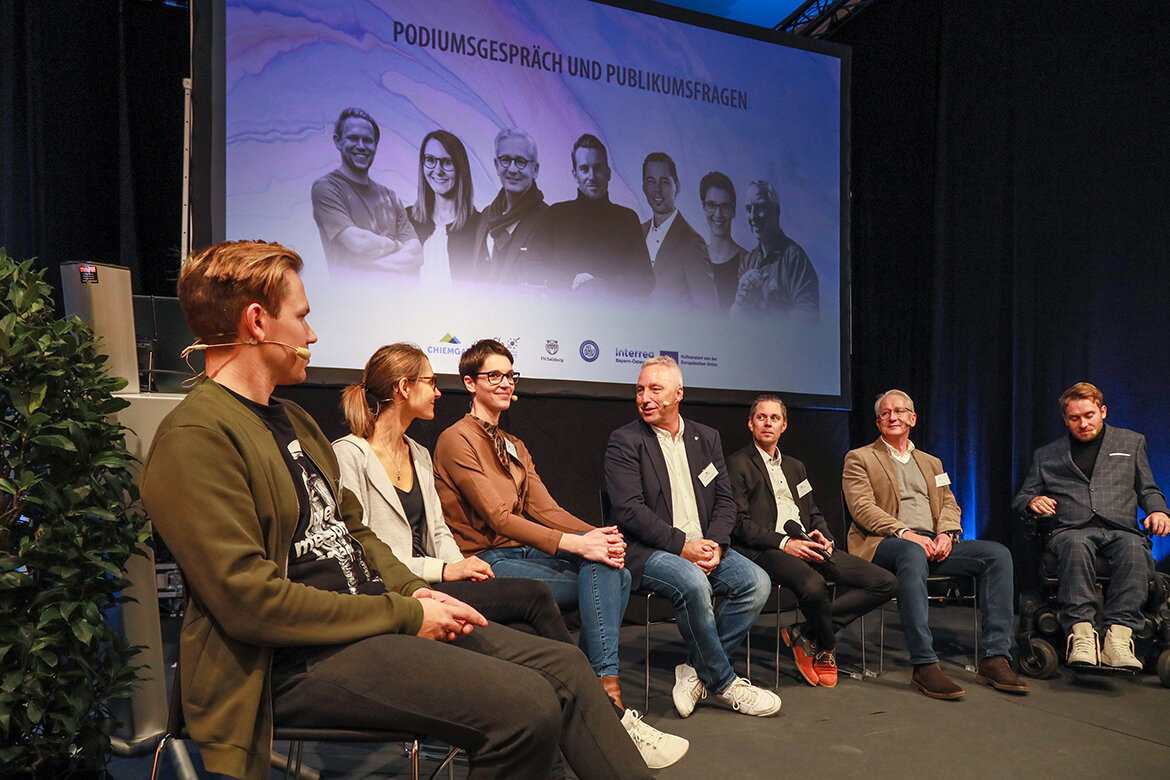
The guests at the panel discussion: Benjamin Förtsch, Lea Carnuth, Helena Gey, Herbert Fritzenwenger, Franz Bauer, Gerald Schölzel, Samuel Koch (from left to right)
On November 14th 2024, the first transnational congress took place in Traunstein, Bavaria, as part of the Interreg project Resilient Tourism. Numerous participants enjoyed an exciting afternoon with inspiring presentations and discussions on the topic of strengthening people & employees.
Resilient tourism - empowering people & employees! This was the motto of the first congress of the Interreg Bavaria-Austria project Resilient Tourism, in which the Kufstein University of Applied Sciences is playing a leading role. At the invitation of project partner Chiemgau GmbH - Tourismus, numerous tourism professionals and tourism enthusiasts gathered at the Kulturforum Klosterkirche in Traunstein on the afternoon of November 14th 2024 to experience enlightening keynote speeches - including from well-known actor and encourager Samuel Koch. There was also the opportunity to join the event live online.
DEVELOPING STRENGTHS FROM CRISES
Many people still remember Samuel Koch's serious accident on the TV show Wetten, dass...? in 2010, when he was just 23 years old. Since then, the former gymnast has been paralysed from the neck down. But Samuel Koch was not broken by this fate, instead he fought his way back into life, completed his acting studies and is now not only on stage in theatre and film, but also as a speaker. In Traunstein, he took the audience on his personal journey through the four phases of a crisis and how he overcame it. He spoke impressively about the shock at the moment of realisation, phases of discouragement and doubts about one's own worth. "But man is a human being", Samuel Koch emphasised, "not a human doing". What he means by this is that we do not first experience our value through useful action, but through our mere existence. Samuel Koch shared these and many other valuable insights with the audience at the congress, always accompanied by a pinch of humour.
THE EFFECT OF THE SMALL STONES
Benjamin Förtsch, owner of the Hotel Luise in Erlangen, gave further impulses on individual resilience. He spoke openly about his personal strokes of fate, fears in the face of climate change and existential crises in the hotel business. Challenges like these are like stones in water: they can dramatically change the course of events. Benjamin Förtsch concluded: "Set the right stones to deal with the flood." As an example, he talked about the stones he uses to determine the course of the river at his Hotel Luise, from greening measures and AI-supported systems to the model project for renewable hotel rooms. A clear vision, inspiring through stories, considering sustainability as the basis for all decisions and realising the five Inner Development Goals as a team are also important to him.
ACCOMPANYING EMPLOYEES THROUGH CHANGE
Hotelier Gerald Schölzel reported on intense times of change when the Seeon Monastery in Chiemgau underwent an economically necessary conceptual reorganisation under his management. Since 2017, the previously purely conference hotel has also been open to private overnight guests. The change required many strategic adjustments to the new target group and presented the team with enormous challenges and learnings, starting with details such as the quantity of food at the breakfast buffet. However, targeted coaching sessions for the employees ensured that everything soon ran smoothly again and the hotel is now a popular tourist destination.
EARLY WARNING SYSTEM FOR TOURIST REGIONS
After a coffee break with intensive discussions, Lea Carnuth from the Kufstein University of Applied Sciences presented the resilience index developed in the Resilient Tourism project. She began by pointing out how differently tourism associations have recovered from the shock of the coronavirus crisis and outlined the variety of possible crises that could affect the tourism industry in the future. For this reason, suitable indicators have been developed in recent months in cooperation with the Salzburg University of Applied Sciences on the basis of specialist literature and in dialogue with tourism professionals in order to measure the resilience of the individual tourism associations. Lea Carnuth presented initial analyses of the seasonal concentration of overnight stays and the results of the economic dimension of the resilience index. The complete index will be freely available online as an interactive dashboard from the beginning of 2025 and will also include action plans to strengthen resilience in the tourism regions.
THE GUESTS IN CONVERSATION
The subsequent panel discussion was moderated by Herbert Fritzenwenger, former ZDF expert and co-commentator for biathlon competitions. During the discussion with the guests, it quickly became clear that a full purse alone is not enough to be crisis-proof for the future. Government support and a reliable, resilient team are essential for tourism companies. For the individual, Samuel Koch even put forward the deliberately provocative thesis that financial carelessness is rather paralysing when it comes to overcoming crises.
In the discussion about the future of ski tourism, the guests largely agreed that there was no way around the expansion of year-round offers. In this respect, the panellists saw great opportunities in the mountain bike and e-bike sector. There was less agreement on the question of how tourism offers and events can be organised as sustainably as possible. At the heart of the controversy was the allocation of responsibility to tourists on the one hand (keyword: individual travel) and to the operators or organisers on the other. However, the need for effective climate protection in order to mitigate one of the most threatening crises of our time, climate change, remained undisputed.
OUTLOOK ON UPCOMING EVENTS
The congress in Traunstein was the first of a total of three congresses that will be organised over the course of the project. Next year, the next congress will take place in Salzburg on the topic of Resilient Tourism - Strengthening Businesses & Organisations! In 2026, the Kufstein University of Applied Sciences will host the final congress Resilient Tourism - Strengthening Regions & Destinations!
The aim of the series of events is to sensitise tourism professionals in the regions of Upper Bavaria, Salzburg and Tyrol to the importance of the topic of resilience and to bring them into dialogue with each other to exchange experiences and knowledge. Thanks to funding from Interreg Bavaria-Austria, the congresses are always free of charge for all interested parties.
Link:


